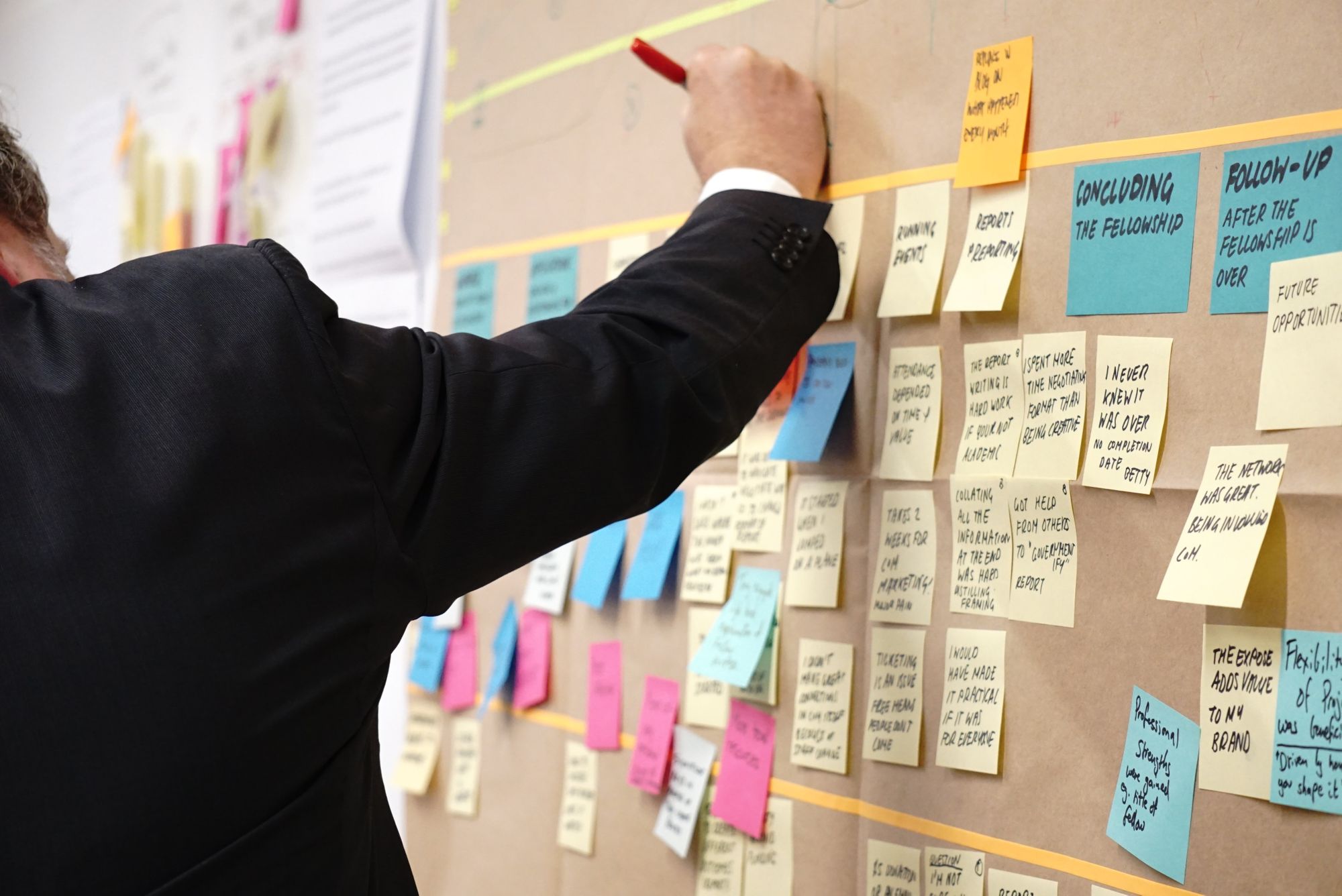Burnout
In December of 2019, I burned out for the first time in my professional career. Today, I'd like to talk about what I went through, the events that led up to it, and what I'm doing now to recover.

In December of 2019, I burned out for the first time in my professional career. It was rough; far harder of an experience than I would have imagined. Since then, I've taken some major steps to help prevent this from occurring again and to heal from that experience.
Today, I'd like to talk about what I went through, the events that led up to it, and what I'm doing now to recover. They may not work for you, but maybe my experiences will help prevent your burnout before it happens.
A quick disclaimer: obviously this story involves my employer. I'm not mentioning their name (although I'm sure it's not hard to figure out) because who I work for is not relevant. I am still working for that same employer, and I am certainly not placing any blame on them. No employer is perfect, and my employer is no exception, however I have worked for them – and will continue to – because of how much I enjoy what I do and the company I work for. For now, let's just call them CorpiCorp.

My First Job
Back in January of 2011, I started working for CorpiCorp as a co-op student. My university offered a work placement program that was interwoven with regular coursework, and I was lucky enough to spend my third and final work term with CorpiCorp.
One time, when a complex, high-impact defect was found, all the developers sat around trying to figure out a solution. One of the lead developers specifically asked me, "What do you think, Brian?". Me? I'm still in school. I don't know anything. But, I was a member of the team. Title, years of service, none of that mattered. All that mattered was coming up with a solution.
CorpiCorp had a knack for empowering its team. When somebody had a new idea that was going to make our lives easier, we were encouraged to pursue it. Does that defect or feature we're discussing during backlog grooming sound interesting to you? Go for it – it's all yours. I got handed one of the most complex pieces of functionality to finish the last half of, a feature that literally saved thousands of person-hours in the first year of usage alone. I had no idea I could do so much.
I stayed on with the team after my co-op term ended, working part-time while I finished up my degree. The day after I wrote my last exam, I was back in the office, working full time.
The team I was on at CorpiCorp gave me a multitude of opportunities. I worked with some truly amazing mentors, picking up new features, and after just over two years, I picked up additional responsibilities. I was now doing production support and becoming the mentor for new co-op students as they came in. As the years went by, we grew the team, and I was one of the main people doing interviews. I got to travel to meet with partners, dip my fingers into architecture, bring automated testing to the team, and establish best practices for building new features.
I don't know if there was a tipping point, but somewhere along that road, if somebody had a question about the product, they started asking me. Maybe it was to test me, maybe it was because I knew the answer. But somehow, I had a talent for figuring things out. And if somebody asked me to look into something, it never mattered how busy I was; I would get them an answer, no matter what.
Nowadays, I have been around long enough that I have unofficially earned the title of Team Lead. Can't figure out how to implement that new widget? Brian can show you how. Production issue you can't reproduce? No problem, Brian's been involved in building almost every feature in some capacity in the past 9 years. Unsure what the industry best practice is? Brian has probably read something about it, or at least knows where to look.
That need to help others, and in turn, the knowledge that others turn to you for advice, is intoxicating. It's like a drug, and I was addicted.

Project X
Project X (not its real name) was the code word for a whole new featureset our product owners wanted us to build. It had lofty, exciting goals; this would be a game-changer for us in the industry. The catch was, we had to maintain our existing roadmap, and Project X was massive. There was simply no way our team could do both Project X and our roadmap simultaneously. We had no choice but to hire a few more people and bring in contractors. Our team would handle the existing roadmap, and the contractors would build the new functionality. I would work with the contractors to review code, architecture, and pretty much any major development decisions.
After getting bids from major contracting firms, we settled on an offshore team, who laid out their plan to get this done with the aggressive timelines we required. They were confident they could get this done on time. With a start in January 2019, they planned on having the first iteration out the door in June, with each new release coming out once a month, finishing up in October. I had my doubts, but perhaps they would pull it off.
It wasn't even close.
June rolled around, and they weren't even half done. No automated tests were written. Code quality and standardization were nonexistent. The contractors were working long hours to try and make deadlines. It's hard not to get frustrated; when all you see is code not up to your standards and you wonder how much of this your team will have to rewrite to follow our provided-to-the-contractors standards, it's easy to forget that there are real people who are trying their best on the other side. You can't help but wonder if you would have been better off trying to do both Project X and your main backlog. At least things would be up to standards.
Exception cases are found. More stories are added to the backlog to address them. We are told the delivery date needs to be pushed out to implement these new stories.
Every time I'm asked if a build is ready for UAT, I go and smoke test it. It's hard not to stumble across a defect. I felt like Sideshow Bob from The Simpsons, trying to walk somewhere but stepping on a rake with every step I take. My friends in UAT wonder how this stuff is getting to them, and why it hasn't been found by QA. I worry about our customers, our service staff, our sales team, our development team.
Concerns are voiced all throughout this process about the lack of quality in the code, the lack of best practices, the lack of automated tests, the frequent regressions that occur. We further reiterate to our contractors the importance of these things. Strongly worded emails are written. Hard conference calls are had.
June turns to July, turns to August, turns to November. We go live with the first iteration, to a small set of internal early adopters. Whereas a normal deployment for us takes maybe two hours with validation testing, this deployment took twelve.
One milestone complete, three more to go.

Breaking Down
I was working from home on a cold day in the middle of December. I spent a lot of the last quarter of 2019 working from home. I would rather be in the office, but the extra 60-90 minutes in my day was essentially required if I was going to get anything done. Overtime was pretty much a given for me, at this point. I had a figurative blank cheque from my boss to work as much as was deemed appropriate.
At the end of 2019, the amount of overtime I billed for double the amount of vacation time I took.
It was time for our daily defect triage call, and I had a seemingly innocuous conversation with a colleague at the beginning of that meeting, which went something like this:
Them: Hey Brian, do we know how we're going to deal with <complicated but extremely important problem to solve>?
Me: No clue, go ask <other smart developer>.
Them: <other smart developer> was the one who was asking.
Me: ...oh...
And that was it. That one, innocent question, broke me.
Five minutes later, I excused myself from that meeting, closed my laptop, crawled into bed, and proceeded to bawl my eyes out for at least a half-hour. I lost track of time.
Once I pulled myself together, I cancelled all of my meetings for the day, called my boss, and explained what happened. We then proceeded to take everything off my plate, and I took the following week off work. While I had that scheduled as a vacation to relax, it instead turned into one of recovery. The two other colleagues I reached out to were also very supportive and offered to help however they could. When one of them asked if I was alright, all I could respond with was "no".

Recovery (Or, How I Got Myself Out Of This Shitstorm)
My road to recovery started before my breakdown, but in hindsight, it was too little too late.
Many of these are specific to my situation, and won't work for everybody. I am very fortunate to have supportive leadership above me, and I've put in my time to show that this investment in my own mental health is an investment in their team. Your mileage may vary wildly with these.
Ultimately, my main focus for what I do from now on comes down to my yearly theme: The Year of Health. I am blatantly ripping this off from CGP Grey, but essentially I try to keep in mind my mental and physical health with every decision. Generally, try to move in the direction that makes me healthier. Not healthy? Try to avoid it.
Remove Key-Person Dependencies
First off was figuring out where our key-person dependencies were. Earlier in the year, our team wrote out the various key competencies that our team requires, in some capacity. At the end of this, we had identified around 20-30 competencies.
I was the only person who could do half of the items on that list. This is not okay.
We started putting together an action plan and began cross-training when we found ourselves with a bit of spare time. In retrospect, we needed to dedicate all of my time to training so that I could eliminate these key-person dependencies. The other person doesn't need to be as good as you, they just need to be capable of doing the work. They will become more proficient over time.
One of my friends once said (and I'm paraphrasing here) that if you go on vacation for a week, nobody should notice. If you go on vacation for two weeks, your coworkers might wonder where you are. If you go on vacation for a month, the whole place burns down. Where I was, a week of vacation wasn't feasible.
One-on-Ones With Your Team
The second pre-breakdown change that I made was doing One-on-Ones with the other developers on the team. A half-hour every week with every developer, no exceptions. Get to know them, pair program with them, help them grow. This seemed like a natural thing to do if for no other reason than I was trying to fulfill that Team Lead role, but this also helped establish rapport with some developers who were overseas and I never got to chat with a lot. If your team members feel comfortable talking with you, they are more likely to ask you questions and be honest with you.
Aggressively Push Back On Overtime And Non-Essential Jobs
That desire to constantly help others, to never say no to someone asking for help, may have been my undoing. You can't help others if you don't help yourself.
Requests would come in that I simply had to decline. I would leverage The Eisenhower Method to determine what requests I should action, what I should decline, and what I should pass off to others. Many requests simply didn't need to be done.
In the same vein, significant overtime is a sign that something is organizationally flawed. Something was not planned properly, not communicated properly, or expectations were not appropriately set. These are all things that can be addressed. I specifically put it in my 2020 goals to work as little overtime as possible.
Journaling and Mood Tracking
On the personal side of things, I realized I was having trouble gauging my emotions and how I was feeling. More importantly, I was struggling with why I was feeling the way I was. Mood tracking and journaling helped with this.
For mood tracking, I started using Moodpath after hearing it recommended on the Cortex podcast. This simple app prompts you three times a day, and it asks you some pointed questions; if you select the negative option, it then asks you how much you are affected by it. Every two weeks, you are given a summary of how you have been, and may make recommendations to go see a medical professional depending on your answers.
Journaling can be done in any number of ways, and there are plenty of analog and digital methods of doing this. I'm certainly not going to rehash them here, but what I will say is I have been using Joplin as a generic note-taker, and spend a few minutes at the end of each day writing about how work and life went, and how I feel about things that happened in the day.
Exercise
Joining the gym at work was one of the best things I could have done. It forced me to get up early so I could get to the gym while there was essentially nobody there, gave me a big endorphin rush to get me through the workday, and has helped me with my steadily declining self-image. I found a workout routine that worked for me, and I've really been enjoying it.
With the whole COVID-19 situation going on, that gym is now unavailable. Instead, I'm doing yoga every day. The combination of physical exercise and mental quieting leaves me feeling relaxed at the end. Yoga With Adriene is a fantastic resource (I started with her series entitled Home – it's awesome!), but there are plenty of other videos out there. Find someone who speaks to you.
Talk To Somebody
I wouldn't have gotten through this if it weren't for my friends. I have a few very close friends who checked in on me after my breakdown to make sure I'm doing alright. I was able to talk with them about the experiences I was going through, and just having somebody to talk through things with is instrumental.
If you're able to, a psychologist is another great resource. If your health care plan happens to cover it or if you can afford it, check in with one at least once a year. If you're struggling with something see them every few weeks, or at a cadence that works for you. I legitimately wish that this was covered by our universal health care because of how good it was for me. The unbiased listener who is actually qualified to provide recommendations on how to deal with certain situations is amazing.

Today
I have no idea if the steps I have taken here are the most efficient way for me to fix things. All I know is that they are working for me. I'm happy to be able to say I'm in a much better mental state than I was back in December. I'm certainly not where I want to be, but I can see the progress being made, just by looking at Moodpath and my journal. These tools are essential for me to see the progress.
Looking back on things – hindsight being what it is – I can clearly see the buildup of my stress levels to a point where I could no longer handle it, however at the time, I just felt...stressed. I chalked it up to just regular growth in a professional environment, and everyone else was just handling it better than I was. It was not evident to me that extended stress is not normal, but as somebody who struggles with sharing their feelings or even putting them into words, I just assumed that others were feeling stressed out as well and had just learned to deal with it.
For the record, I don't blame any individual contractor for this. But the dichotomy between an employer – who wants a solid, maintainable product that they can sell – and a contracting firm – who wants to deliver on their contract – are two completely different goals that simply do not align in most cases. We are simply not working towards a common goal. If you're going to roll with contractors (and there are certainly valid reasons to have contractors sometimes), integrating them in as fully-fledged team members is critical.
I'm lucky to be in the position I am at work. Not everyone will be so fortunate to be able to essentially straight-up tell their employer what their recovery plan will be (I said I wanted to take at least six weeks off throughout the year and additionally take Fridays off for two months. I'm still surprised that they didn't push back in the slightest). I'm also incredibly fortunate that I don't need the overtime to make ends meet, and I'm aware that others are not in that situation. There are various budgeting things you can do to help alleviate this, but that may not be an option for you.
Whatever you're going through, I hope reading this helps. Today's society seems to value hiding one's emotions, to be strong and unwavering, to be more, no matter the cost. What that doesn't help with is your happiness and your health. You can always find another job or a smaller house. You can't get another life.
No job requires you to sign away your happiness when you sign that contract; don't let them take it away from you.